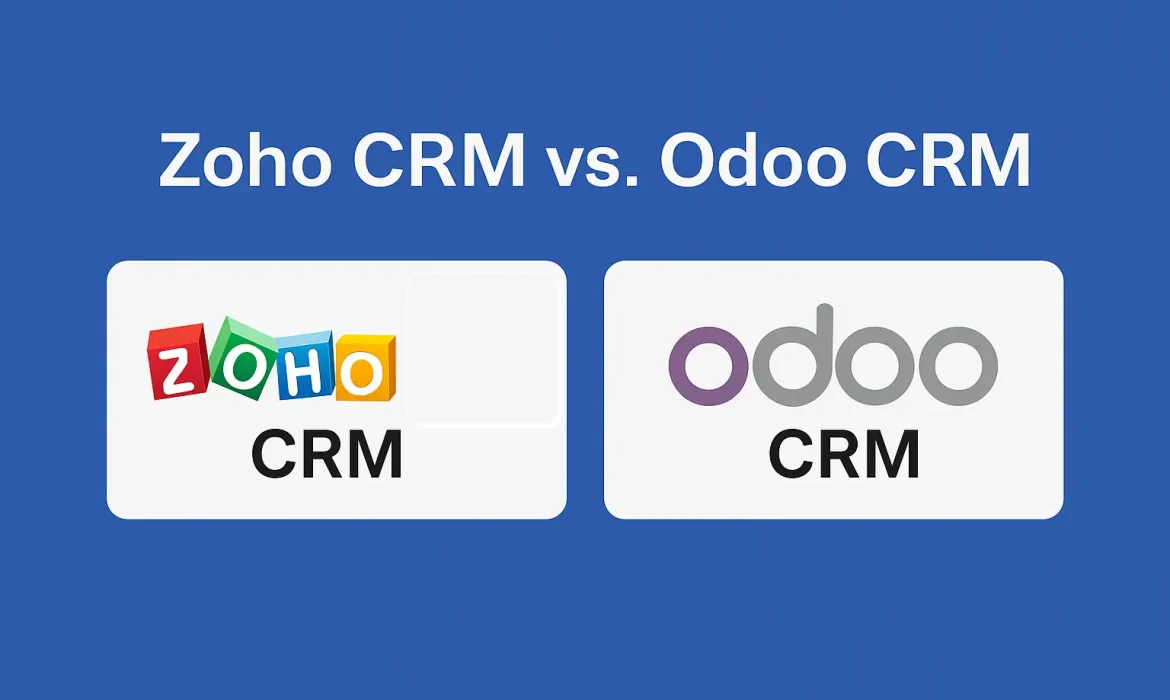
Selecting the right CRM is critical for growing businesses. Zoho CRM and Odoo CRM are both mature platforms, but they differ in focus, functionality and deployment model. Zoho CRM is a comprehensive SaaS solution (used by over 50 million users worldwide) with strong out‑of‑the‑box sales and marketing automation, AI-assisted sales forecasting (via “Zia”), and extensive marketplace integrations.
Odoo CRM is part of the modular, open‑source Odoo ERP suite, offering a flexible, integrated approach (Odoo claims 12 million+ users of its apps). Odoo’s CRM emphasizes pipeline management, lead scoring and seamless ties to other business apps (Inventory, Accounting, eCommerce, etc.). Below we compare the two systems across sales, marketing and support modules, as well as integration, scalability and pricing.
Sales Automation
Zoho CRM (Sales Force Automation)
Zoho automates lead capture, scoring and deal management to streamline sales workflows. For example, it provides lead management (lead capture and scoring) and deal (pipeline) management features with stage tracking and reminders. Zoho’s AI assistant Zia can predict sales outcomes and anomalies – e.g. scoring leads, forecasting revenue, and even suggesting sales actions. Key sales features include workflow automation, approval processes (Blueprints), and built‑in telephony (click‑to‑dial, call logging) and social integration. Sales teams get customizable canvases and dashboards, mass email and multi‑currency support. In short, Zoho covers the entire sales cycle “out of the box,” from web-to-lead forms and email campaigns to order quotes and analytics.
Odoo CRM (Sales Module)
Odoo focuses on pipeline visualization and automation. It automatically captures inbound leads from emails, VoIP calls, website forms, social media and event attendees. Sales reps can drag-and-drop leads/opportunities through customized pipeline stages and schedule activities (calls, meetings) from within each opportunity. Odoo’s built‑in scoring and analytics assign a “probability of success” to each lead/opportunity, and integrated email/VoIP support means every email or call log attaches directly to the contact/opportunity. Quotes can be generated in a few clicks with product configurators, and sales orders sync to inventory and invoicing modules (if used). In essence, Odoo CRM provides an end-to-end pipeline tool with tight ERP integration. Want to see how Odoo’s pipeline automation could fit your sales team? Contact Encloud Solutions to book a quick demo or consultation today.
Key Differences: Both platforms offer lead/opportunity tracking, activity scheduling and reporting. Zoho’s strength is its AI‑driven insights (Zia) and rich workflow automation (Blueprints, macros) built specifically for sales teams. Odoo excels when integration with other business areas is needed: for example, quoting in Odoo CRM can automatically pull product/price lists from Odoo Inventory/Sales, and won opportunities flow into Orders. Zoho’s sales UI tends to be more polished for CRM use, while Odoo’s pipeline approach is highly customizable by an administrator or developer.
Also Read: What Is Property Management Software
Marketing Capabilities
Zoho CRM (Marketing)
Zoho CRM includes basic marketing automation features and integrates closely with Zoho’s marketing suite. It supports targeted email campaigns, customer segmentation, and lead nurturing workflows. For instance, you can design mailing lists by segment and schedule drip campaigns to nurture leads at each funnel stage. Zoho also has Google Ads integration (visibility into ad spend vs. sales) and an Event Management module to capture conference or webinar leads. These features work seamlessly with Zoho’s analytics and SalesIQ live chat, giving a complete sales+marketing loop. If deeper marketing automation is needed, Zoho’s separate products (Campaigns, Marketing Automation, Social, Survey) can be integrated.
Odoo CRM (Marketing)
Odoo does not bundle all marketing tools inside its CRM app, but provides a suite of dedicated marketing apps that integrate seamlessly. Odoo Email Marketing lets you design drag‑and‑drop newsletters with templates and track open/click rates. The SMS Marketing app (free with unlimited users) offers high open-rate campaigns – you can segment your database and send scheduled text campaigns to event attendees, subscribers or customers. Other apps like Social Marketing and Events allow posting to social channels and managing event registrations. Crucially, Odoo’s Marketing Automation engine can run cross-channel nurture flows: for example, triggering an email or SMS when a website form is submitted or a sale completes. In sum, Odoo covers email, SMS, social and event campaigns via separate modules, all linked by a unified contacts database.
Support/Service Modules
Zoho CRM (Support)
Within Zoho CRM you get built‑in customer support features. The Cases module handles tickets, solutions (knowledge base articles), and case routing/escalation rules. Web-to-Case forms and email-to-case capture customer requests into the CRM. This means sales and support data live together (for cross-sell and service context). Zoho also offers Zoho Desk as a separate helpdesk product for more advanced service workflows (multi-channel support, customer portal, SLA tracking), which can integrate with Zoho CRM.
Odoo (Helpdesk)
Odoo’s Helpdesk app provides multi-channel ticketing with a kanban overview. It handles support emails, website support forms and even live chat (via the integrated Website Live Chat). You can define custom SLA rules, email templates and canned responses to automate support processes. Odoo Helpdesk also supports selling support contracts (managed in the Timesheets app) and includes a built-in knowledge base (FAQs and community forum links). Customers can even log in to a self-service portal to view or close tickets. In short, Odoo Helpdesk offers a modern ticketing system with SLA automation and self-service, while Zoho CRM’s native support features are more basic (though extendable via Zoho Desk).
App Ecosystem & Integrations
Zoho Marketplace
Zoho CRM benefits from Zoho’s ecosystem of 40+ integrated cloud applications. The Zoho Marketplace alone lists over 900 plug‑and‑play third-party extensions. Built-in integrations cover Google Workspace, Office 365, MailChimp, DocuSign, social networks, telephony (RingCentral, Twilio), and many more. Zoho provides REST APIs, SDKs and low‑code tools (Deluge functions, Web/Mobile SDKs) to customize or connect any system. This makes Zoho CRM extensible for marketing automation, accounting, chat, and other use cases.
Odoo App Store
Odoo is fundamentally an ERP suite, so its CRM is designed to work alongside all other Odoo apps. The Odoo Apps Store offers thousands of modules (many by third‑party developers) covering virtually every business need (from POS to manufacturing). All core Odoo apps are built to integrate – for example, adding the CRM app to your Odoo instance automatically works with Odoo’s Sales, Inventory, Accounting, eCommerce, Email Marketing and more. Odoo supports integration through its open API (XML-RPC/JSON), Odoo Studio customization, and community connectors (e.g. Shopify, Magento, payment gateways). It can also integrate with external systems via REST/JSON APIs or connectors (e.g. Google Docs, shipping carriers). In practice, Odoo’s ecosystem is geared toward one-stop solution (all business processes under one platform), whereas Zoho’s is a mix of Zoho cloud apps plus hundreds of third‑party plugins.
Pricing Overview
Zoho CRM
Zoho’s pricing is per user/per month (billed annually), with a free plan (up to 3 users). The paid tiers are: Standard ($14/user/mo), Professional ($23), Enterprise ($40), and Ultimate ($52). Each adds features (e.g. inventory, Zia AI, advanced customization) and higher data limits. All plans include cloud hosting, while add-ons (extra storage, portals, higher email limits) incur additional fees. Implementation is generally fast with Zoho’s cloud delivery; basic setups can cost as little as $1,000–$3,000, though full enterprise configurations (custom apps, training, data migration) can run into tens of thousands. Zoho’s transparent subscription costs make it predictable, and there are no hidden user-seat minimums.
Odoo
Odoo offers a unique model. The Community Edition is free to download and install (no licensing fee), but does not include official support or some advanced modules. For cloud or supported on‑premise use, Odoo’s paid plans are per-user per month. An “Odoo One App” plan (free) allows unlimited users on any single app (e.g. only CRM). The Standard plan (all apps) starts around $31–$37 per user/month (annual). A Custom plan (~$37–$45) adds multi-company, API and studio tools. All paid plans include hosting, upgrades and unlimited functional support. In practice, small companies sometimes start on Community to save license cost (paying only hosting/partner fees), then move to Enterprise as they need official support or apps. Implementation costs for Odoo can be significant if many modules or customizations are involved; engaging an Odoo partner is common.
Implementation Costs
Zoho’s cloud model often means lower upfront costs (no servers, simpler setup). Odoo’s Community version is free, but both Odoo Community and Enterprise implementations typically involve server costs, partner configuration and possibly custom development. For a fair comparison, include partner fees and data migration expenses.
Also Read: 10 Reasons to Invest in Custom CRM Development for Long-Term Business Growth
Best Use Cases & Recommendations
- Startups and Small Teams: Zoho CRM’s free tier (3 users) and user‑friendly interface make it ideal for startups on a tight budget. It provides core CRM and sales automation immediately. Odoo’s “one-app free” plan can also cover a basic CRM for unlimited users, but requires more tech setup. In general, Zoho often yields faster ROI for a pure sales/marketing focus.
- Growing SMBs: If you need a robust CRM with marketing tools, Zoho’s Professional/Enterprise plans deliver email campaigns, ads integration and AI features at competitive per-user pricing. If you also need ERP features (inventory, accounting, eCommerce) under one roof, Odoo Standard (all apps) could be more cost-effective, and grows with additional Odoo modules.
- Large/Global Enterprises: Odoo shines in complex, multi-company or multi-site environments. Its Enterprise edition supports multiple languages and countries, and can be hosted on-premise for data residency. Zoho CRM Enterprise supports global sales operations with multi-currency and compliance (GDPR, HIPAA), but large companies needing specialized processes (manufacturing, advanced inventory) may find Odoo’s all-in-one model better suited. Encloud Solutions specializes in both Zoho and Odoo enterprise setups — contact us to discuss which solution can best support your global operations.
- Highly Regulated Industries: Zoho has built-in compliance for GDPR and HIPAA, plus mature data security (encryption, SSO). Odoo can be secured as well, but data control comes through on-prem deployments. If strict regulation demands in-house hosting or custom controls, Odoo’s open-source nature offers more flexibility.
- Customization Needs: For bespoke workflows (e.g. custom quoting engines, unique sales processes), Odoo provides more low-level customization (via Odoo Studio or coding). Zoho offers a developer platform and Marketplace apps, but extreme custom features may require extra Zoho products or custom coding by a consultant.
Need a custom CRM tailored to your workflows? Encloud Solutions can develop and deploy both Odoo and Zoho solutions that match your exact business needs. Fill out the form to get a consultation.
| Feature / Aspect | Zoho CRM | Odoo CRM |
| Deployment | Cloud‑only SaaS (no on‑prem) | Cloud or on‑premise (Community or Enterprise) |
| Business Focus | Standalone CRM and sales/marketing automation | Part of integrated ERP suite (CRM + inventory, accounting, etc.) |
| Sales Features | Lead/contact/deal management, forecasting, sales workflows, CPQ | Pipeline management, automated lead capture (email/VOIP/website), AI scoring |
| Marketing Tools | Email campaigns, list segmentation, Google Ads integration, event management | Separate apps: Email Marketing, SMS Marketing, Social, Marketing Automation |
| Customer Support | Cases (tickets), knowledge base, web-to-case, Zoho Desk (add-on) | Helpdesk app: SLA rules, multi-channel tickets, KB, contracts |
| Integrations | 900+ third‑party apps via Zoho Marketplace (Drive, MailChimp, Slack, etc.) | All Odoo modules (Sales, Inventory, Accounting, etc.), plus open API and community connectors |
| Customization | REST API, SDKs, Deluge scripting, low-code Canvas builder | Odoo Studio editor; open-source code; external APIs (XML-RPC/JSON) |
| Pricing (per user) | Free (3 users); $14–52/mo/user (Standard to Ultimate) | Free for 1 app (unlimited users); ~$31–37/mo/user for full suite |
| Typical Use Case | SMBs needing quick CRM deployment, extensive built-in features | Companies needing ERP+CRM integration, custom workflows, manufacturing |
Conclusion and Next Steps
Both Zoho CRM and Odoo CRM are powerful platforms. Zoho CRM offers a user‑friendly, multi‑feature CRM on the cloud, ideal for sales-driven organizations that want fast deployment and rich analytics (with built-in AI/Zia). Odoo CRM offers a more flexible, modular approach, best when CRM must tie directly into other business processes like inventory, accounting or project management. Zoho’s strong points are its extensive integrations and SaaS simplicity; Odoo’s are its open‑source customization and unified ERP ecosystem.
Ultimately, the choice depends on your priorities. For an all-in-one cloud CRM that “just works” for marketing and sales, Zoho CRM is compelling. For a tailored end-to-end business platform (especially if you need ERP functions or have highly specialized needs), Odoo CRM can be the better fit. In practice, many organizations evaluate both: for example, a startup might start on Zoho’s free plan, then migrate to Odoo Enterprise later (or vice versa).
Need guidance? A certified CRM advisor can help match these platforms to your business. Encloud Solutions (encloudsolutions.com) is a trusted CRM implementation partner with deep expertise in both Zoho and Odoo. Their consultants can assess your requirements, run trial deployments, and oversee implementation – ensuring you get the right balance of features, cost and scalability. Whether you lean toward Zoho’s cloud suite or Odoo’s integrated ERP, working with an experienced partner like Encloud Solutions will help you avoid pitfalls and maximize ROI.
Table of Key Differences: The table above summarizes the main distinctions between Zoho CRM and Odoo CRM across key areas. Use it to quickly compare pricing, modules and ideal use cases. Remember that beyond feature lists, real success comes from aligning your CRM choice to your company’s processes, size and industry requirements – and from expert implementation. Both Zoho and Odoo have proven track records; picking the right one often hinges on which ecosystem (Zoho’s cloud apps vs. Odoo’s all-in-one ERP) best matches your vision.
Also Read: Best Real Estate ERP Software


